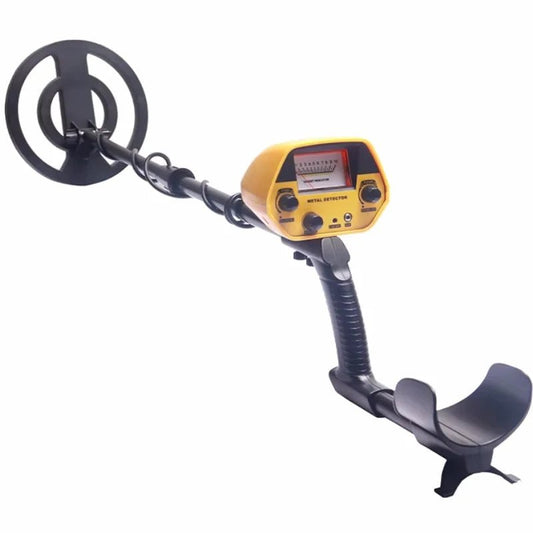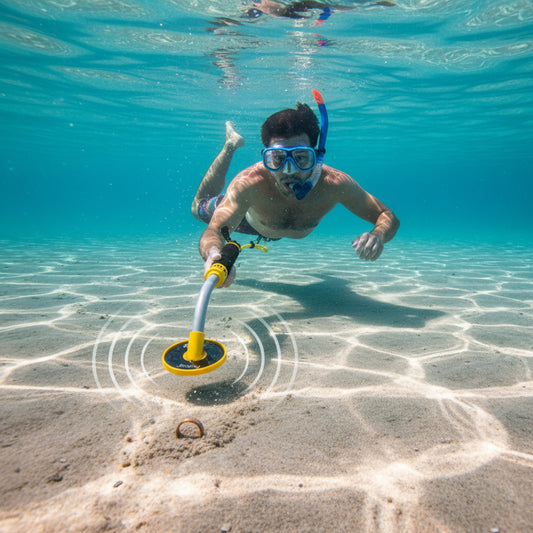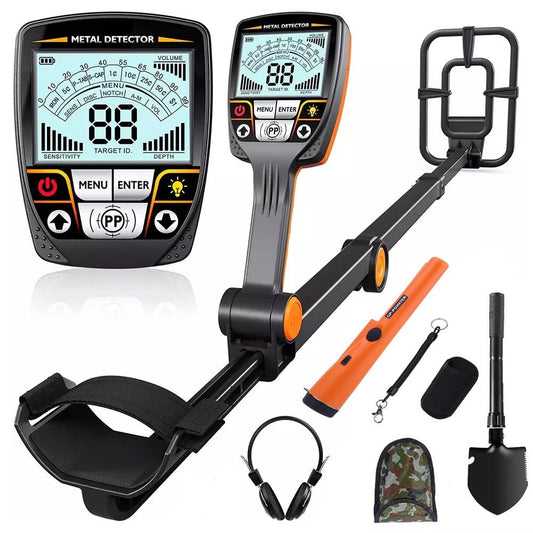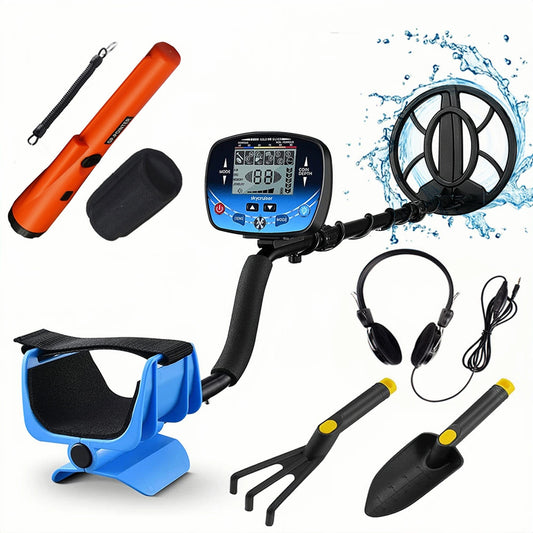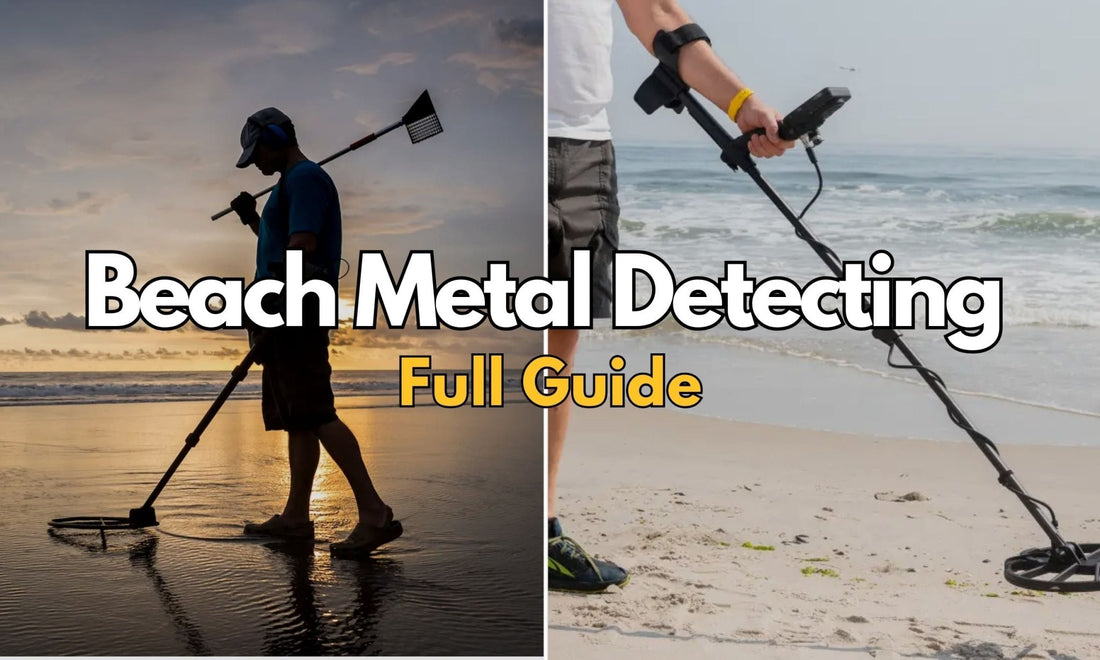
Ultimate Guide to Beach Metal Detecting: Tips, Tools, and Best Locations
Share
Why Beach Metal Detecting is Popular

What Makes Metal Detecting Beaches Unique
Beaches are one of the most popular places for metal detecting because they’re heavily trafficked and have the potential to yield valuable finds. Items like jewelry, watches, and coins are often lost by beachgoers, and the movement of tides helps expose or move items closer to the surface, making beaches ideal for metal detecting.
Treasure Hunting Potential on Beaches
The treasure potential on beaches is higher than in many other areas because people frequently lose personal items in the sand or water. This includes valuable items such as gold and silver rings, necklaces, and vintage coins. The sand makes it easier to dig and sift through, and beach detectors can often cover large areas quickly.
Types of Items Found While Beach Metal Detecting

Beach detectorists commonly find items such as:
- Coins: Both old and modern coins are frequently lost in the sand.
- Jewelry: Rings, bracelets, and necklaces are common finds, especially near high-traffic beach areas.
- Historical Artifacts: Depending on the beach’s location, you may find relics from shipwrecks or older items washed up by tides.
Can You Metal Detect on Beaches? Understanding Permissions and Regulations

Before heading out, it’s essential to understand the rules about where you can metal detect on beaches. Regulations vary by location, and it’s important to respect local laws and obtain any necessary permissions.
Can You Metal Detect on Public Beaches?
In general, metal detecting is allowed on many public beaches, especially those that aren’t designated as protected areas or national parks. However, each state and county may have specific regulations. Some beaches restrict metal detecting to certain areas or times of day, especially if they’re crowded or environmentally sensitive.
Can You Metal Detect on Florida Beaches and Myrtle Beach?
Metal detecting on Florida beaches is largely permitted, but there are exceptions. For instance, detecting is not allowed in state parks or certain protected areas due to historical preservation laws. Myrtle Beach in South Carolina is another popular location for detectorists, and metal detecting is allowed there, although certain restrictions apply during peak tourist season to ensure visitor safety.
Best Practices for Checking Local Regulations Before You Start
Always check with local authorities or beach management to confirm metal detecting rules. Online resources, local government websites, and metal detecting forums are excellent resources for understanding beach-specific guidelines. Additionally, some areas may require permits, especially for deeper water detecting, so plan accordingly to avoid fines or confiscation of equipment.
Essential Beach Metal Detecting Equipment
To make the most of your beach metal detecting adventures, choosing the right equipment is crucial. Beach metal detecting presents unique challenges, such as wet sand, saltwater interference, and the need for specialized digging tools.
Metal Detecting Beach Sand Scoop: Finding the Right Scoop for Sand

A metal detecting beach sand scoop is one of the most important tools for any beach detectorist. Sand scoops are designed to sift through beach sand quickly, allowing you to locate small objects without extensive digging.
For wet sand and shallow water detecting, stainless steel or aluminum scoops with large holes work best. Lightweight plastic scoops are ideal for dry sand, as they’re easy to carry and sift quickly.
Waterproof Metal Detector Options for Beaches

Since beach environments expose detectors to moisture and salt, using a waterproof metal detector is highly recommended.
Waterproof detectors are built to handle exposure to both saltwater and freshwater, and some are even submersible, allowing you to search in shallow water.
Popular options for beach metal detecting include the Minelab Excalibur II and Garrett Sea Hunter Mark II, which both perform well in saltwater and can reach deeper targets in wet sand.
Pinpointer Metal Detector
A pinpointer is a crucial element of your metal detecting abilities on the beach.
It will allow you to pinpoint the exact target of yourfind, saving you time and boosting efficiency.
Additional Gear for Comfortable Beach Hunts
Along with a metal detector and sand scoop, consider the following tools:
- Headphones: Headphones help you hear faint signals over beach noise and can enhance focus.
- Beach Bag: Use a durable bag or pouch to collect your finds and keep your hands free.
- Gloves and Sun Protection: Protect your hands with gloves and wear sunscreen or a hat for long beach sessions.
Best Metal Detecting Beaches in the U.S. and What to Expect
Here are some of the best metal detecting beaches across the U.S. and what makes each unique:
-
Myrtle Beach, South Carolina: Known for its bustling boardwalk, Myrtle Beach is one of the most popular beaches for metal detecting. Detectorists often find coins, jewelry, and vintage items here, especially near the pier and in areas of high foot traffic.
-
Daytona Beach, Florida: Daytona Beach’s large tourist draw makes it a great spot for detectorists to find lost items. The shifting tides and soft sand make it easy to recover objects, and early mornings are ideal for avoiding crowds.
-
Huntington Beach, California: Huntington Beach attracts thousands of visitors each year, offering ample opportunities for metal detecting. The beach’s high volume of visitors makes it likely to yield coins and jewelry, especially after large events.
-
Ocean City, Maryland: Ocean City’s beaches are popular among detectorists due to the high tourist traffic and accessible sand. With stretches of public beach and a history of shipwrecks, it’s common to find a mix of modern coins and historic artifacts.
-
Waikiki Beach, Hawaii: Known for its beautiful scenery and rich history, Waikiki Beach is a prime location for metal detecting. Detecting here often results in unique finds, as many tourists bring jewelry that can get lost in the sand.
Each beach presents unique conditions and treasure potential, so choosing the right location can greatly enhance your beach metal detecting experience.
Tips and Techniques for Beach Metal Detecting Success

Whether you’re new to beach metal detecting or an experienced detectorist, understanding the best techniques can make a big difference in the quality and quantity of finds. Here are some top beach metal detecting tips to help you get the most out of each hunt.
Best Times for Metal Detecting on Beaches
The timing of your beach hunt plays a critical role in your success. The best times for beach metal detecting are often early morning and late afternoon, when the beach is less crowded, and you have more freedom to search popular areas.
Low tide is also ideal, as the receding water reveals sections of the beach that are normally submerged, increasing your chances of finding lost items. After major holidays or beach events, you may find freshly lost coins, jewelry, and other valuables in areas with heavy foot traffic.
Tips for Metal Detecting Beach Sand and Wet Sand
Beach sand can be tricky to search due to the difference between wet and dry areas. In dry sand, metal objects tend to be closer to the surface, and targets are often recently lost items. For detecting in dry sand, a lightweight sand scoop and moderate sensitivity setting should be sufficient.
Wet sand and the areas near the waterline present unique challenges. Saltwater often interferes with metal detectors, so using a waterproof model or adjusting the ground balance on your detector will help avoid false signals. Since wet sand can also conceal objects more deeply, use a metal detector with a higher depth setting and a sturdy sand scoop to sift through compacted areas effectively.
Techniques for Metal Detecting in Shallow Water
For those interested in detecting in shallow water, waterproof detectors are essential.
Submersible models, like the Minelab Excalibur II or Garrett Sea Hunter Mark II, are specifically designed to handle water pressure and salt interference, which are common issues in shallow ocean waters.
When detecting in shallow water, scan areas near rock formations, sandbars, and piers, where valuables often collect. Use a slower sweep motion and overlap your swings to avoid missing targets that are buried under silt or sand.
Beach Metal Detecting Etiquette and Safety Tips
To keep beach metal detecting enjoyable and safe for everyone, follow a few essential etiquette and safety practices. Respecting the environment, fellow beachgoers, and local laws not only keeps the hobby sustainable but also encourages a positive reputation for detectorists.
Filling in Holes and Respecting Beachgoers
One of the most important etiquette tips is to always fill in holes after digging. Leaving holes on the beach can be hazardous to others and may result in restricted access for detectorists. After retrieving a find, simply push the sand back into the hole to restore the area. Additionally, be considerate of others by avoiding crowded sections of the beach and respecting personal space, especially during peak hours.
Staying Safe While Metal Detecting in Surf and Sand
Metal detecting on the beach can expose you to various elements, so safety is essential. Wear sunscreen and bring plenty of water to stay hydrated, as long sessions in the sun can lead to dehydration. If you plan to detect in the water, be cautious of tides and currents, especially in rough surf areas. Wearing a hat and polarized sunglasses can also reduce glare from the sun and improve visibility, helping you spot items more easily.
Beach Conservation and Responsible Treasure Hunting
Respect for nature is fundamental in the metal detecting community. In addition to filling in holes, avoid disturbing wildlife or delicate ecosystems. Certain beaches may have protected areas, so always be mindful of regulations. Consider using a finds pouch to collect any trash or debris you come across. Responsible treasure hunting not only preserves the environment but also enhances the beach experience for future visitors.
Seasonal Tips for Beach Metal Detecting
Beach conditions and find potential can vary significantly depending on the season. Knowing how to adapt to seasonal changes can increase your success in finding valuable items.
- Summer: This is prime time for beach metal detecting, as beachgoers frequently lose coins, jewelry, and other personal items. Early mornings are often ideal before the crowds arrive.
- Winter: Coastal storms and high tides during winter can wash up interesting artifacts and expose layers of sand where items have been buried. If the weather permits, winter detecting can yield unique finds.
- Post-Storm: After a storm, heavy wave action may reveal previously hidden items. Beach erosion can uncover layers where older items are buried, offering a chance to find relics, coins, or lost valuables.
Final Thoughts on Beach Metal Detecting
Beach metal detecting is a fantastic hobby that combines skill, patience, and the thrill of discovery. By choosing the right equipment, understanding beach etiquette, and practicing effective detecting techniques, you can enhance your chances of uncovering hidden treasures. Whether you’re exploring local beaches or traveling to some of the best metal detecting beaches in the U.S., each hunt offers a new adventure.
Remember to stay safe, respect the environment, and enjoy the unique rewards that come with beach metal detecting. With the right tools and tips, your next beach hunt could uncover a valuable piece of history or a meaningful item lost in the sands.


